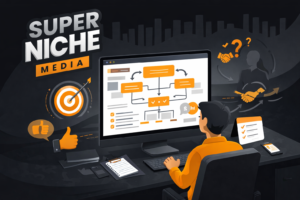Growing small teams face a critical decision that can shape their business trajectory: building an in-house marketing team or outsourcing marketing functions to external experts. This choice impacts everything from budget allocation and operational agility to long-term growth potential and brand consistency.
Super Niche Media works with growing businesses at this exact crossroads, helping them navigate the complex decision between internal team development and strategic outsourcing. The stakes are high—choosing the wrong approach can drain resources, slow growth, or compromise marketing effectiveness.
This guide explores the pros and cons of each approach, providing a framework to help you make the right choice for your unique situation, budget, and growth stage.
Understanding The Needs Of Growing Small Marketing Teams
Growing small marketing teams face unique challenges that larger organizations rarely encounter. Limited budgets force difficult choices between hiring specialists, investing in technology, or expanding marketing reach. Resource constraints mean team members often wear multiple hats, handling everything from content creation to analytics.
The need for specialized skills becomes more pressing as businesses grow. Early-stage companies might succeed with generalist marketers, but growth often demands expertise in areas like paid advertising, marketing automation, or conversion optimization. Acquiring these skills internally requires time and training investments that growing teams may not have.
Marketing agility becomes crucial during growth phases. Market conditions change rapidly, customer segments evolve, and product offerings expand. Teams need flexibility to pivot strategies, test new channels, and scale efforts quickly based on results.
Marketing strategy evolution adds another layer of complexity. What works for a startup with 10 customers differs dramatically from strategies needed to reach 1,000 customers. Growing teams must constantly reassess their approach, often requiring new skills and perspectives that existing team members may lack.
Pros Of Building An In-House Marketing Team
Building an in-house marketing team offers several advantages:
- Unmatched control over brand messaging and strategic priorities. Internal teams intimately understand company values, culture, and vision, enabling authentic content that truly reflects the brand personality.
- Deep product knowledge. In-house marketers live and breathe the company’s offerings, grasping customer pain points, product benefits, and competitive advantages at a granular level, which leads to more effective targeting.
- Smooth internal communication and collaboration. Without time zone differences or external barriers, teams can pivot quickly, share information freely, and maintain alignment across initiatives.
- Long-term investment in team development. As marketers deepen their understanding of the market and customers, they become a competitive advantage through accumulated expertise.
- Ideal fit for businesses with specialized products, strict regulations, or complex sales processes that require extensive internal knowledge.
Cons Of Building An In-House Marketing Team
Higher fixed costs represent the most immediate challenge of building in-house marketing teams. Salaries, benefits, equipment, and overhead expenses create significant ongoing financial commitments that continue regardless of marketing performance or business cycles.
Limited skill sets due to smaller team sizes create capability gaps. Most growing businesses can afford one or two marketing hires, but comprehensive marketing requires expertise in content creation, paid advertising, analytics, design, and strategy. Small internal teams struggle to cover all necessary areas effectively.
Recruitment and training challenges compound these issues. Finding skilled marketers willing to join growing companies can be difficult, especially in competitive markets. Once hired, new team members require time to understand the business before becoming fully productive.
Burnout and bandwidth issues plague small internal teams. When growth demands exceed team capacity, overworked marketers become less effective and more likely to leave. The risk of skill stagnation also emerges with small teams having limited exposure to diverse challenges.
Pros Of Outsourcing Marketing
Outsourcing marketing brings its own set of benefits:
- Immediate access to broad specialized skills and advanced tools that would be costly or impossible to develop internally. Agencies and consultants bring expertise across SEO, paid ads, automation, and conversion optimization.
- Flexible scaling of resources. Outsourced teams can expand or reduce capacity as needed, helping businesses manage busy periods or budget fluctuations without the complications of hiring or layoffs.
- Faster execution. Experienced external teams have refined processes and workflows, enabling quicker implementation of proven strategies.
- Cost-effectiveness. Retaining an agency often costs less than hiring multiple internal specialists, while providing access to entire teams of experts.
- Fresh perspectives and industry insights. Agencies bring experience from diverse clients and markets, spotting opportunities internal teams may overlook.
Cons Of Outsourcing Marketing
Less direct control over daily tasks and messaging can create frustration for business owners accustomed to hands-on management. External teams work within their own processes and timelines, which may not always align with internal urgency or preferences.
Communication and alignment challenges often arise when working with external teams. Different time zones, communication styles, and priorities can slow decision-making and create misunderstandings about expectations or deliverables.
Risk of inconsistent brand voice emerges when external teams don’t fully understand company culture or values. Without careful management, outsourced content and campaigns may feel disconnected from authentic brand personality.
Dependency on external partners creates vulnerability. If relationships sour or agencies lose key team members, marketing continuity can be disrupted. Critical knowledge and relationships may reside outside the organization.
Mitigation strategies include establishing clear communication protocols, regular check-ins, detailed brand guidelines, and contracts that protect intellectual property and ensure knowledge transfer.
How To Decide: A Framework For Small Teams
Making the right choice requires honest assessment of your business stage, budget, and internal capabilities. Early-stage companies with limited budgets often benefit from outsourcing to access skills they can’t afford internally. More established businesses with predictable revenue may find in-house teams offer better long-term value.
Consider which marketing functions should remain internal—such as strategic planning, brand development, and customer relationship management—and which can be outsourced, like technical execution, specialized campaigns, or data analysis.
Hybrid models are popular, combining in-house leadership with outsourced specialists. Many successful businesses have internal marketing managers overseeing strategy and brand consistency, while external experts handle specific projects or skills.
Ask yourself:
- What are our growth goals and timeline?
- Which marketing skills do we currently lack?
- How important is direct control versus cost efficiency?
- What is our budget for marketing talent and tools?
- How quickly do we need to scale marketing efforts?
Regularly reassess as your business grows, because marketing needs change significantly between a 10-person startup and a 50-person company.
Conclusion
Both in-house and outsourced marketing approaches offer valid benefits and trade-offs for growing small teams. The optimal choice depends on your unique combination of budget constraints, growth goals, internal capabilities, and industry requirements.
Success comes from honestly assessing your situation, choosing an approach that aligns with current needs, and remaining flexible as circumstances evolve. Many thriving businesses find hybrid solutions that combine the best aspects of both approaches.
Take time to evaluate your specific needs, consider your long-term vision, and choose the marketing structure that best supports your growth objectives while fitting your current resources and constraints.




